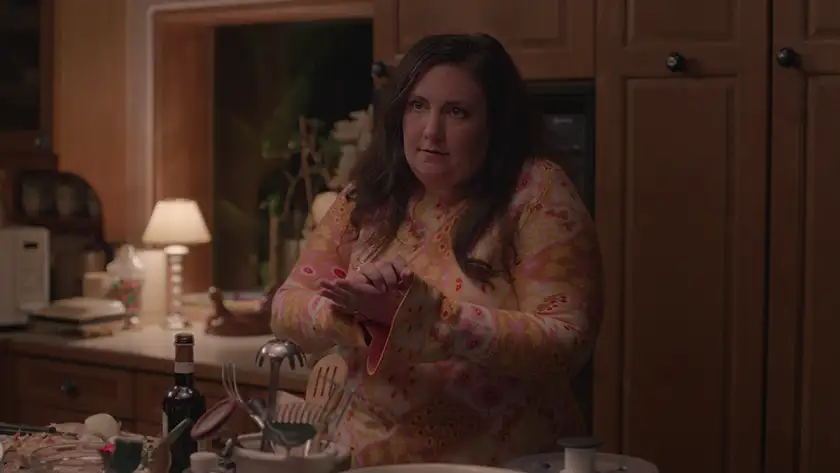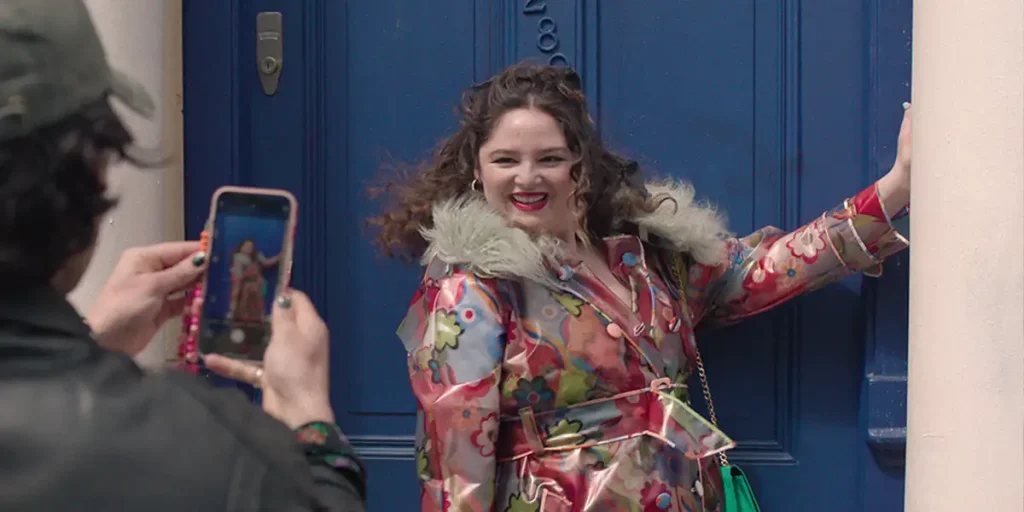Too Much is Lena Dunham’s best since Girls and Megan Stalter brings real emotion to the mess of modern love.
Showrunners: Lena Dunham & Luis Felber
Directors: Lena Dunham, Janicza Bravo, Alicia MacDonald
Genre: Rom-Com
Number of Episodes in Season 1: 10
Release Date: July 10, 2025
Where to Watch: Stream it globally on Netflix
Lena Dunham‘s return to television feels like reconnecting with a close friend who’s come back wiser and wittier than ever. After Girls concluded its polarizing but undeniably influential run, Dunham walked away from the glare of the spotlight, directing smaller films and taking occasional acting assignments while the cultural conversation moved on from topics she introduced. Now, with Season 1 of Too Much, a ten-episode Netflix series she created with musician husband Luis Felber, Dunham proves her voice has only sharpened with time.
The premise mirrors romantic comedies of the past with a distinctly modern twist: Jessica (Megan Stalter, Cora Bora) is a New York workaholic in her mid-thirties, reeling from a broken engagement to Zev (Michael Zegen, The Penguin) and slowly isolating from everyone she knows. After a late-night incident where she breaks into the basement of the brownstone she once shared with Zev and his new girlfriend, knitting Instagram influencer Wendy (Emily Ratajkowski, Gone Girl), she knows she needs a change. The only solution is to take a job in London offered by her brother-in-law (Andrew Rannells, I Don’t Understand You), where she plans to live a life of solitude like a Brontë sister.
Landing in London with a suitcase full of regrets and the stubborn determination to reinvent herself while holed up in a cramped flat lost in her thoughts, she’s barely been in the city for 24 hours when she meets Felix (Will Sharpe, A Real Pain). A moody musician who paints his fingernails a Sally Bowles shade of green and wears vinyl jackets like armor, he’s a walking series of red flags for her bruised heart. However, she finds their unusual connection impossible to ignore, even as it creates more problems than it solves. Felix treats vulnerability like a foreign language, and every time they clash over her American fight-it-out bluntness versus British keep calm and carry on reserve, soon neither can resist stumbling and fumbling into each other’s mess.
What makes Too Much extraordinary right off the bat is how gracefully Dunham has evolved as a storyteller. Gone is the sometimes grating self-absorption that characterized her earlier work; instead, we get refined character development rooted in authentic emotional truth. The show’s 10 episodes have titles that cleverly riff on classic romantic films, but their content feels refreshingly contemporary instead of looking back at those evergreen films as hokey representations of love. This is romance for the disillusioned, those who wonder if the concept of true love remains possible but genuinely hope it is.
Though still in her early 30s, Stalter delivers what might be a career-defining performance as Jessica, trading her trademark cartoonish flinches for moments of gut-punch vulnerability. Previously known for her gloriously over-the-top portrayal of Kayla in HBO’s Hacks, Stalter shows remarkable, previously untapped range here. Gone are Kayla’s rubber-faced expressions and valley girl shocked looks; instead, we get reactions to words and actions that sting, moments where Jessica can’t help but wince at personally aimed cruelty. Rather than lean into slapstick, Stalter makes Jessica’s refusal to rock the boat feel like a survival tactic born of heartbreak rather than a character flaw. She inhabits the “we accept the love we think we deserve” mentality for much of the season, making her eventual decision to break old habits emotionally cathartic for both character and audience.
Opposite Stalter, Sharpe proves an ideal match. Blending humor and melancholy in equal measure as a struggling musician who isn’t looking for love but finds it in a brassy American who both overwhelms and fascinates him, Sharpe sheds his chameleon persona and brings a wounded soul aura to Felix. Their chemistry is immediate and fiery; you believe these two are constructing intimacy in real time, brick by brick. Scenes range from laugh-out-loud to graphically raw (he spits in her mouth during sex, far more vividly sexual than any nudity) to achingly honest. One minute you’re laughing at their cultural miscommunications, the next you’re leaning forward, hoping they’ll get over their hang-ups and finally drop their guards.
The supporting cast sparkles without ever stealing the spotlight and reads like an experienced cinephile’s wish list. Rita Wilson and Rhea Perlman (Star Wars: The Bad Batch) layer Jessica’s family scenes with affectionate chaos, with Wilson as a mom dipping her toes in the dating pool and Perlman’s grandmother dispensing bawdy advice at every turn. Dunham pops up as Jessica’s neurotic sister, sparring shamelessly with Rannells for rapid-fire laughs. Janicza Bravo (director of A24’s exhilarating Zola) and Leo Reich, as co-workers blissfully oblivious to basic empathy, serve scene-stealing moments that land without ever feeling forced.

Adèle Exarchopoulos (The Animal Kingdom) breezes in as a French ex who blurts toxic truths with disarming candor; her breezy contempt is a welcome jolt. Even Andrew Scott (All of Us Strangers) shows up to play a loopy director, reminding us he can be funny and unhinged without breaking a sweat. At the same time, Richard E. Grant (Saltburn) and Naomi Watts (The Friend) make brief but memorable curveball cameos as Jessica’s imperious boss and his wife.
Behind the camera, Dunham’s direction has grown more assured. Dunham directed eight of the ten episodes (Bravo and Alicia MacDonald handled Episodes 8 and 9), and her eye for capturing the best of her actors is balanced nicely with her ear for dialogue that keeps the action always moving forward. Cinematographer Ricardo de Gracia balances London’s grime and glam, from neon nightclub interiors to the plainness of Jessica’s quaint flat provided by her company. Arielle Cooper-Lethem’s costumes underline Jessica’s New York edge (which feels either a decade behind or a generation ahead of the UK’s current trends) and Felix’s rock-and-roll weariness. Felber’s score drifts between indie folk and pop hooks, accentuating emotional peaks without ever drowning out dialogue. This is a show that understands its setting and, like Girls, celebrates every cobblestone and pub.
What gives Too Much most of its lasting power is the generous refusal to reduce Jessica’s journey to superficial tropes. Dissecting everyday vulnerability through a lens that’s fearless and unfiltered, the series sidesteps body-image sidetracks and zeroes in on self-worth and the invisible labor of love. Dunham, drawing on a “germ” of her romance with Felber, reminds us that the work of love is often invisible: showing up again, swallowing pride, learning who you are in someone else’s orbit. When Jessica finally decides to push back against old patterns, you feel the weight of every misstep that led her here and the messy repercussions of reopening old wounds.
If there’s a misstep, it’s the occasional inclusion of too many side characters, especially Jessica’s neighbors and some underused co-workers who feel tacked on for local color rather than narrative drive. Our curiosity about Jessica’s job and her quirky colleagues feels tantalizingly underexplored, and by episode eight, her obsession with the manipulative ex circles a bit too close to repetitive territory. Yet even these detours wrap up satisfyingly in the finale, suggesting a natural conclusion should Netflix decide not to renew. Unlike many shows, I felt the completion of a complete arc rather than being left with a cliffhanger mousetrap that might never snap shut.

Episodes five through seven stand as mini-masterpieces, featuring some of the finest and most surprising acting and writing seen on television so far this year. Too Much proves that Dunham’s voice has sharpened with age and life experience, delivering a binge-worthy blend of heartbreak and comedy that retains the observational nimbleness that first captivated audiences in Tiny Furniture. Dunham’s voice, once divisive to some, has grown into something richer and more compassionate.
This is a show about the persistent hope of love in a time that seems hell-bent on pure cynicism. Under Dunham’s guiding eye, Jessica and Felix can teach us that sometimes you have to uproot everything you know to discover what truly matters and that in a tangle of misunderstandings, there’s beauty in not having all the answers. If Netflix greenlights a second season, I’ll be curious to see what happens next for, and this is rare, every character. But even if this is it, Season 1 of Too Much exists as a wonderfully realized celebration of modern romance. It’s funny, fierce, and worth the leap.
Too Much Season 1 (Netflix): Series Plot & Recap
Synopsis:
American workaholic Jessica flees to London after a broken engagement, only to fall for Felix, a moody musician who challenges everything she thought she knew about love and herself.
Pros:
- Megan Stalter’s career-defining performance showcases remarkable range and vulnerability
- Stalter and Will Sharpe’s push-and-pull is both hilarious and heartbreakingly real.
- Smart writing that subverts rom-com tropes while honoring the genre
Cons:
- Some supporting characters feel underexplored despite strong performances
- Jessica’s obsession with her ex becomes repetitive in later episodes
- Occasional narrative detours that distract from the central romance
Season 1 of Too Much is now available to stream globally on Netflix.

